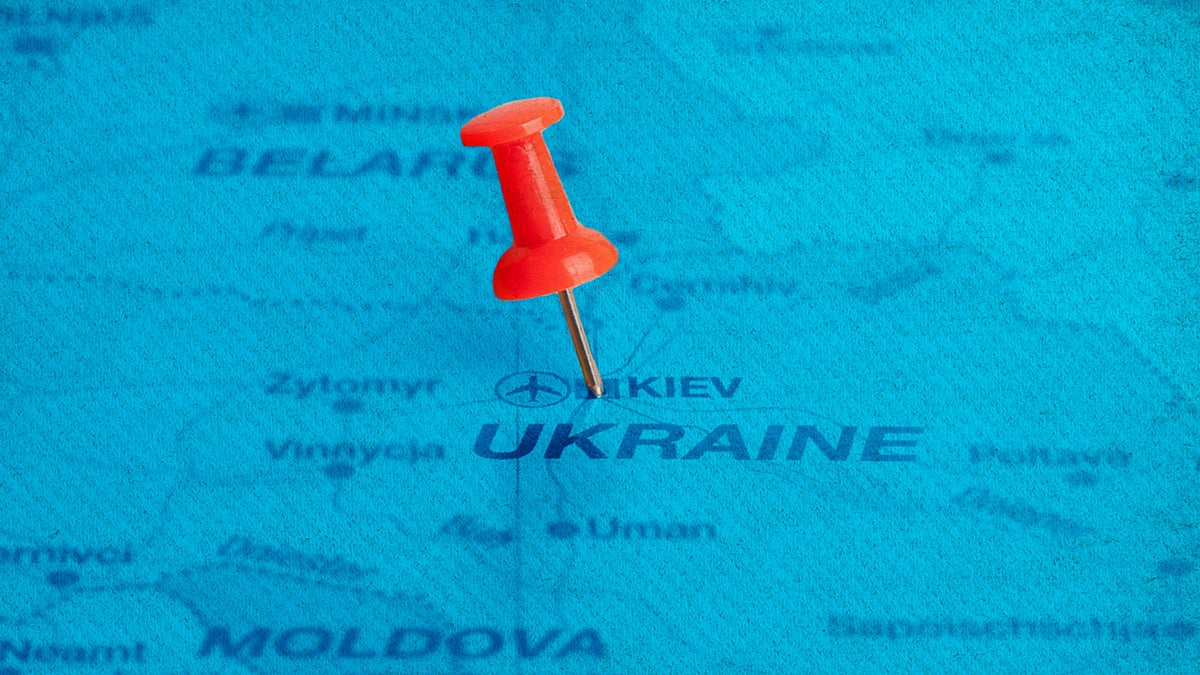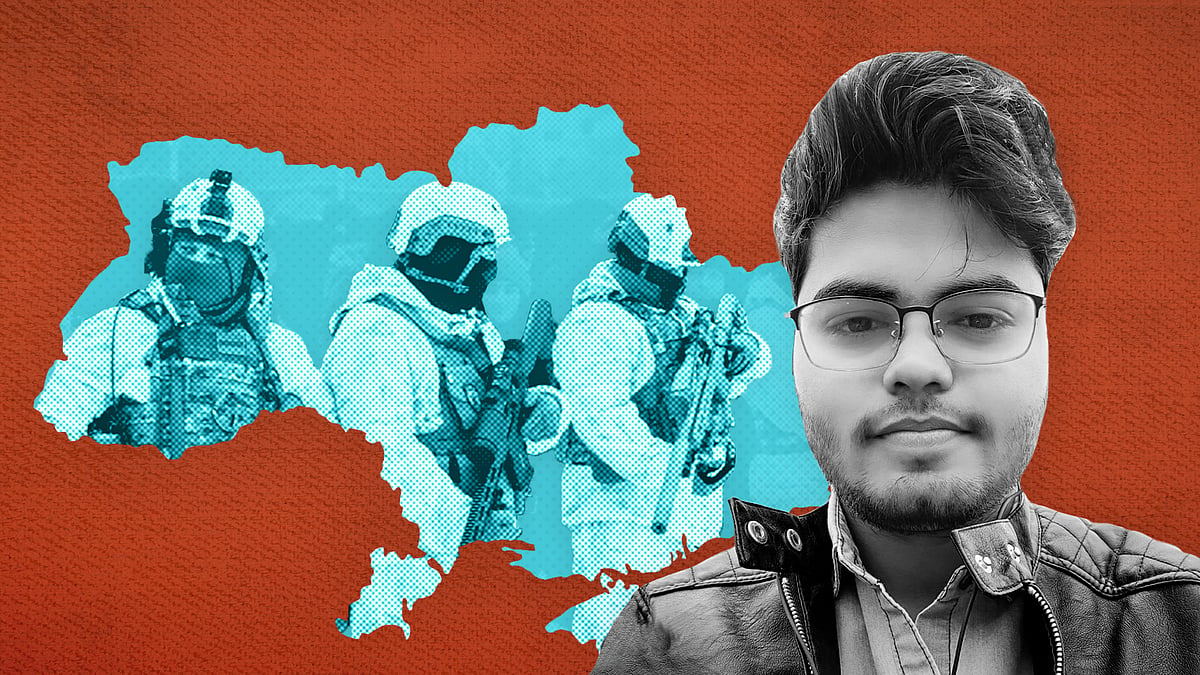Told to keep discussion with PM ‘positive’: Students back from Ukraine
PM Narendra Modi met a bunch of students last week after addressing poll rallies in UP.
“After god, Modi-ji's name was being chanted at home because only Modi-ji now can do anything. No one else can do anything.”
These were lines from a video shared by union minister Piyush Goyal on his Koo account last week. It featured an interaction between over 20 Indian students back from war-hit Ukraine with Prime Minister Narendra Modi – who took time off his busy schedule while campaigning in Uttar Pradesh, wearing a lotus symbol on his blue jacket, at the Lal Bahadur Shastri International Airport in Varanasi.
After listening to all the praise for the BJP government, PM Modi had targeted the previous governments for not focussing on medical education, compelling Indians to study abroad. “Your and your family’s anger is obvious because you had to walk so much to come back. The anger against me is also justified. Well, when the heart shall change, it will love too.”
While the incident was played up in several sections of the media as a reassuring move on part of the government, at least two students part of the meeting – who were among hundreds of Indians who had to walk miles to safer shores – alleged that they were not given the chance to ask the questions they wanted to. They claimed they had many complaints but were given instructions by government officials to only make “positive and non-political” conversations.
“The Prayagraj ADM (Finance) contacted me about meeting the PM. We went with him. The meeting with the PM was good but I had a question that I wasn’t allowed to ask. We were told that we should only tell him what he asks, nothing more. My question was, now that we have returned, what are we going to do,” alleged Vishal Kumar from Handia in Prayagraj who is a fourth-year student of the National Medical University in Ternopil. Kumar returned on March 1 and has two years of studies left.
“The way Russia is attacking, it seems that no university in Ukraine will survive. Would we be able to return to study? What has the government of India’s thought about us?...I have returned after four years of my education, and we are scared about what we’d be doing here. It would’ve been better if we could get some information from the government about this.”
Kumar also pointed to financial problems. “My brother was arranging for money and sending it with a lot of difficulty. We went there because the cost of education is much lesser compared to India. Otherwise why would we go there?”
But he alleged that he was instructed by officials. “They said that we must carefully listen to what the PM says, not say anything political.”

Went to Ukraine because cost of education is much less: Vishal Kumar.
Rithik Divakar, from Prayagraj, is a third-year student of the Ivano-Frankivsk National Medical University in Ivano. “We praised the government a lot. We never got the chance to talk about the problems we face ahead concerning our education and degree…The officials told us that everything we say must be ‘positive’, and to say nothing else. The ADM sahab came to get me. Our phones were switched off. It was said that no one should switch on their phones. When we turned the phone on, they scolded us and made us switch them off.”
Asked what he wanted to tell the PM, Divakar said, “We came back somehow. But the embassy should work for the students who are still there. The people from the embassy should go to the border to receive the students because Ukrainian soldiers are not letting people cross the border. I have returned after spending 35-40 hours there. They are making us Indians cross the border inside trucks first. Some of my friends are still stuck there.”
Like Kumar, Divakar too is worried about his future. “We have come back after three years of education. What will the government decide for us? It’s not like there are one or two students, there are 20-22,000 of them. Nothing was discussed with PM Modi on this issue. The whole talk was 5-10 minutes long, then he left.”

Never got the chance to talk about our problems: Rithik Divakar.
Prayagraj ADM Jagdamba Singh said, “I did not give any suggestion at my level…because my job was only to send the students to Varanasi. I took three students with me…their passes were ready. Only they went inside (where the interaction took place). We were not allowed to enter. The Varanasi administration officials, including the ADM (law and order) and other staff, were inside.”
Hope and fear under the snow
Amid the crisis in Ukraine, social media has been replete with visuals of Indian students recalling harrowing experiences, inside bunkers or at the borders, with several complaints of lack of food and water, and harassment in subzero temperatures.
“The embassy helped us only after we crossed the border. No one helped before we crossed the border. We did everything ourselves,” said Divakar. “I was 200 km away from the Romanian border. We travelled 180 km by bus which we booked ourselves. We had to walk for the remaining 18 km…It was really cold and snow was falling. After reaching the Romanian border, we had to stand for 35-40 hours. Many of the students had hypothermia. The Ukrainian citizens were made to cross the border while we were stopped. Nobody from our embassy was present there.”
“I am very happy with the Indian government, but only after crossing the border. We faced the problems before crossing the border ourselves. We walked for 18 km with our luggage…the 40 hours we spent standing in the cold has irked me. I would have given up if I had to wait there for another 10-15 hours…There was nothing to eat or drink.”
Asked about union minister Prahlad Joshi’s remark that 90 percent of the medical students studying in other countries are unable to clear the NEET, Divakar said, “The fee is so much higher here…Had the fee been less, then the students wouldn’t have to go outside the country. The fee there is about 3 to 4 lakhs per annum; you know the fee here.”
Kumar also recalled his experience. “We were mailing the embassy again and again since February 16, asking them to tell us what we should do. They weren’t replying to the emails. When we called, sometimes the call was picked up and sometimes it wasn’t. Whenever it was picked up they used to say that anyone who wants to can leave. If you want to stay then you can stay, there is no such problem.”
“We thought if the embassy is saying this then the situation won’t be that bad. There was an American girl in our group. She received a message from her embassy to immediately move to Poland. Two-three days later, the American students moved to Poland. We asked the college authorities to move the lessons online so we may study from our respective countries, but they weren’t agreeing to it. They were saying that a war wouldn’t happen.”
After the Russian attack, Kumar said they contacted the embassy again. “Then the notice came that we should leave the country. There were no buses…First, we thought about going to the Polish border but the queue was 50-km-long. So we went towards the Romanian border…there were a large number of people from different countries. Some of the people had been standing there for two-three days. The temperature there was minus five degrees and there was no arrangement for lodging. People stood under an open sky.”
Kumar alleged that no Indian embassy official was present. “We stood for eight hours on the border on the night of February 26. Only the women were made to cross the border, which resulted in a stampede in the end. Their gate was broken. Their officers started firing and they also beat up the people who broke the gate down…Somehow we managed to reach Romania. We were in a camp there, where the people from their NGO were managing the food and water.”
Kumar said his problems didn’t end after reaching Romania. “We had to wait for the flight for two days…There were 350 students at the place I was…There were seven-eight similar camps…But the next day the officials told us that they’d only take 25 of us…somehow I managed to become one of those 25.”
Many BJP leaders have shared a cartoon showing PM Modi acting as a bridge for Indians stuck in Ukraine while those from China, Pakistan and USA, among other countries, are stuck. “America got its citizens out before the blasts began. Not a single American student was there. They were told to leave Ukraine within 48 hours. The students from Pakistan and Nigeria were there though. A Nigerian official could be seen helping their students get out on the Romanian border,” Kumar said.
 ‘Phone calls worse than bombs’: Ukrainian’s postcard from war-torn Kyiv
‘Phone calls worse than bombs’: Ukrainian’s postcard from war-torn Kyiv Calls, rescue appeals, safety hacks and daal: A day in the life of a student trapped in Ukraine
Calls, rescue appeals, safety hacks and daal: A day in the life of a student trapped in Ukraine Mic Drop
A weekly capsule of our podcasts, part of some of India's most-followed podcasts on media, politics, pop culture, food and more.
